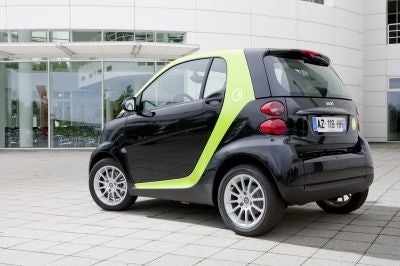Your support helps us to tell the story
From reproductive rights to climate change to Big Tech, The Independent is on the ground when the story is developing. Whether it's investigating the financials of Elon Musk's pro-Trump PAC or producing our latest documentary, 'The A Word', which shines a light on the American women fighting for reproductive rights, we know how important it is to parse out the facts from the messaging.
At such a critical moment in US history, we need reporters on the ground. Your donation allows us to keep sending journalists to speak to both sides of the story.
The Independent is trusted by Americans across the entire political spectrum. And unlike many other quality news outlets, we choose not to lock Americans out of our reporting and analysis with paywalls. We believe quality journalism should be available to everyone, paid for by those who can afford it.
Your support makes all the difference.Germany has stepped up funding for electric vehicles as it seeks to become a world leader in the technology.
The German government said this week that it will spend an extra one billion euros in research and development for EVs, effectively doubling its budget by 2013.
The country is also set to offer tax rebates and dedicated parking spaces in a bid to lure consumers towards zero-emission technology, Angela Merkel told reporters in Berlin, although she rejected the idea of subsidising electric car costs in the same manner as several other countries.
By 2020, the country plans to have 1 million electric cars on its roads, up from only 2,000 to 3,000 all-electric cars in a country of 40 million vehicles today, according to AFP reports.
Unsurprisingly, cars from German automakers such as BMW, Mercedes-Benz and Volkswagen are by far the most popular on German roads, and many of these global names are already digging deep to fund the development of electric vehicles.
BMW launched its i subbrand back in February, promising that two all-electric vehicles - the i3 and the i8 - would be on the road by 2013 as part of a new push for electrification.
Daimler, with production electric vehicles already on the road in the shape of the Smart Fortwo electric, is working with fellow German automotive supplier Bosch on engines which could eventually power a Mercedes-Benz, according to reports from Germany.
Volkswagen is also chasing electric power, confirming last week that it will produce a plug-in hybrid vehicle by 2013 as a way of easing the transition to fully electric vehicles.
With such a range of world-class automotive brands and strong government backing, it will be interesting to see whether Germany emerges - alongside China and the US - as a major global power when it comes to electric vehicles.

Join our commenting forum
Join thought-provoking conversations, follow other Independent readers and see their replies
Comments